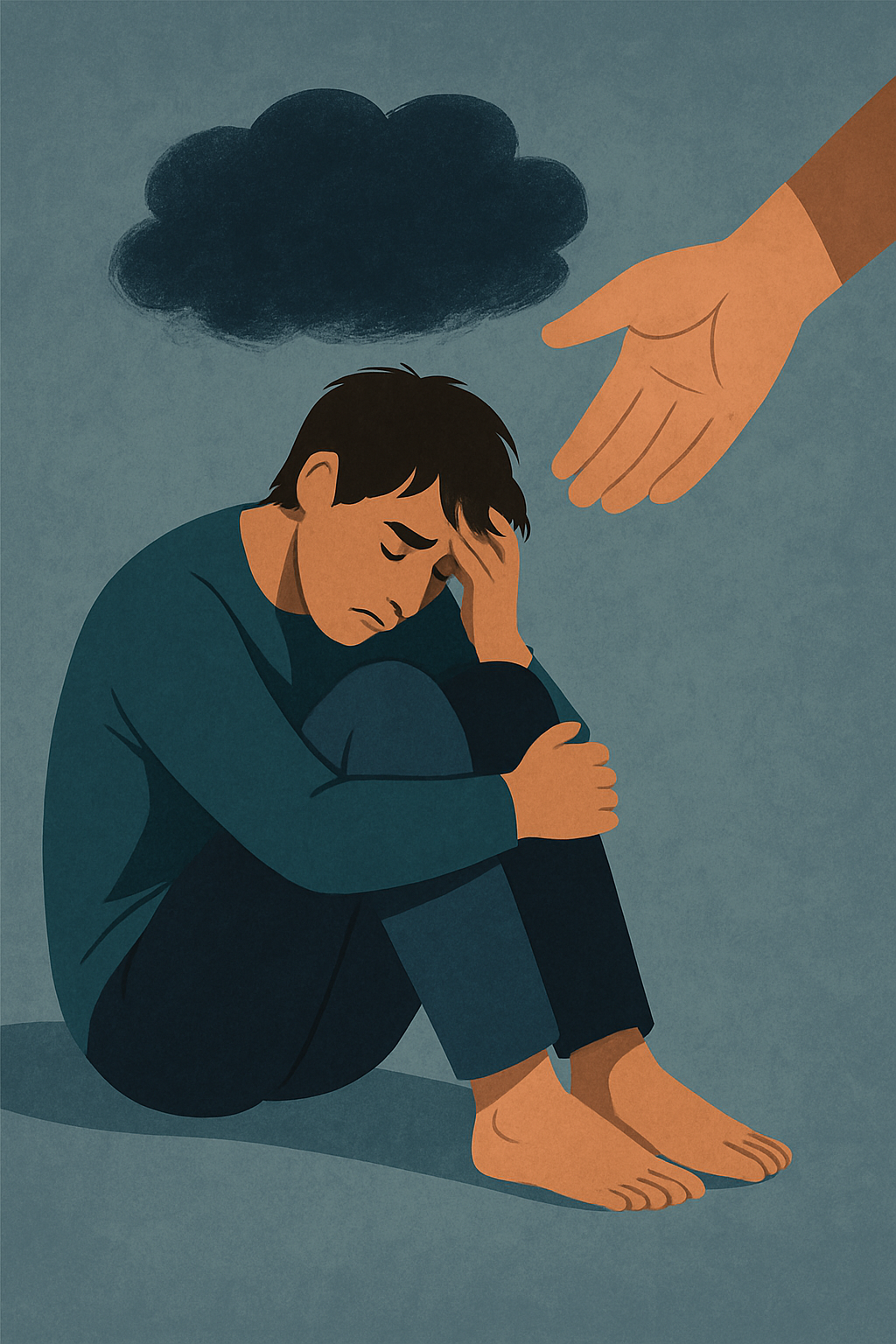Depression is a serious mood disorder that can profoundly impact an individual’s life, affecting how they feel, think, and behave. While it’s normal to experience sadness or low moods occasionally, persistent feelings of hopelessness, loss of interest, and other symptoms can indicate clinical depression. Recognizing the early signs of depression is crucial for timely intervention and improved recovery outcomes. This blog post will explore the common emotional, physical, and behavioral symptoms of depression, highlight the benefits of early detection, and provide tips for seeking help and support.
Common Emotional, Physical, and Behavioral Symptoms
Depression manifests differently in each individual, but there are common emotional, physical, and behavioral signs to look out for. Recognizing these can be the first step towards understanding and addressing the condition.
Emotional Symptoms
Emotional symptoms are often the most recognized indicators of depression. These can include:
•Persistent Sadness or Low Mood: A pervasive feeling of sadness, emptiness, or hopelessness that lasts for most of the day, nearly every day, for at least two weeks [1]. This is more than just temporary blues; it’s a deep, persistent emotional state.
•Loss of Interest or Pleasure (Anhedonia): A significant decrease in interest or pleasure in activities once enjoyed, including hobbies, social interactions, and even sex. Things that used to bring joy now feel flat or uninteresting [2].
•Irritability or Restlessness: While often associated with sadness, depression can also manifest as increased irritability, agitation, or restlessness. Small annoyances can trigger disproportionate anger or frustration [3].
•Feelings of Worthlessness or Guilt: Intense feelings of self-blame, worthlessness, or excessive guilt, often disproportionate to actual events. Individuals may feel like a burden to others or that they are failing in every aspect of their lives [4].
•Hopelessness and Helplessness: A pervasive sense that nothing will ever get better and that one is powerless to change their circumstances. This can be a particularly dangerous symptom, as it can lead to suicidal thoughts [5].
Physical Symptoms
Depression is not just a mental state; it can have profound physical manifestations that are often overlooked or misattributed to other causes. These can include:
•Changes in Sleep Patterns: This can involve insomnia (difficulty falling or staying asleep) or hypersomnia (excessive sleeping). Sleep disturbances are a very common symptom, often leading to fatigue and difficulty concentrating [6].
•Changes in Appetite or Weight: Significant changes in appetite, leading to either weight loss (due to decreased appetite) or weight gain (due to increased appetite or comfort eating). These changes are often unintentional [7].
•Fatigue and Loss of Energy: A persistent feeling of tiredness and lack of energy, even after adequate sleep. Daily tasks can feel overwhelming and exhausting, leading to reduced activity levels [8].
•Unexplained Aches and Pains: Chronic, unexplained physical symptoms such as headaches, digestive problems, muscle aches, or back pain that do not respond to typical treatments. Depression can lower the pain threshold, making physical discomfort more pronounced [9].
•Psychomotor Agitation or Retardation: This refers to noticeable changes in physical activity. Agitation might involve restlessness, pacing, or an inability to sit still. Retardation involves slowed movements, speech, and thought processes [10].
Behavioral Symptoms
Behavioral changes are often noticeable to others and can significantly impact daily functioning. These may include:
•Social Withdrawal: A tendency to pull away from friends, family, and social activities. Individuals may isolate themselves, decline invitations, and prefer to spend time alone [11].
•Neglect of Responsibilities: Difficulty fulfilling responsibilities at work, school, or home. This can include a decline in performance, missed deadlines, or neglecting personal hygiene [12].
•Increased Substance Use: Some individuals may turn to alcohol or drugs as a coping mechanism to numb emotional pain or escape from their feelings, which can exacerbate depressive symptoms [13].
•Changes in Self-Care: A noticeable decline in personal grooming, hygiene, or overall self-care. This can include not showering, wearing the same clothes for days, or neglecting personal appearance [14].
•Suicidal Thoughts or Behaviors: In severe cases, depression can lead to thoughts of self-harm, suicide planning, or actual suicide attempts. This is a critical symptom requiring immediate professional intervention [15].
How Early Detection Improves Recovery
Recognizing the early signs of depression is not just about identifying a problem; it’s about opening the door to more effective and timely intervention. Early detection significantly improves the prognosis and overall recovery journey for several reasons.
Preventing Worsening of Symptoms
Depression, if left untreated, tends to worsen over time. Early intervention can prevent symptoms from escalating in severity and becoming more entrenched. Addressing depression in its nascent stages can reduce the intensity and duration of depressive episodes, making the recovery process less arduous [16]. It’s akin to treating a physical illness before it becomes chronic or life-threatening.
Promoting Faster Remission
Studies consistently show that individuals who receive early treatment for depression are more likely to achieve remission (a significant reduction or disappearance of symptoms) faster than those whose treatment is delayed [17]. Prompt intervention allows for the implementation of therapeutic strategies—whether medication, psychotherapy, or a combination—before the brain’s chemistry and neural pathways become more deeply affected by prolonged depressive states.
Reducing the Risk of Relapse
Early and effective treatment can also play a crucial role in reducing the likelihood of future depressive episodes. By addressing the underlying issues and developing coping mechanisms early on, individuals are better equipped to manage stressors and recognize potential triggers, thereby building resilience against relapse [18]. This proactive approach fosters long-term mental well-being.
Minimizing Impact on Daily Life
Untreated depression can severely disrupt various aspects of life, including work, relationships, and physical health. Early detection and treatment can minimize these negative impacts, allowing individuals to maintain their functioning, relationships, and overall quality of life. It can prevent academic or career setbacks, preserve social connections, and mitigate the physical health complications often associated with chronic depression [19].
Enhancing Treatment Effectiveness
When depression is identified early, treatment options tend to be more effective. Less severe and less chronic forms of depression often respond better to standard treatments. This can mean a shorter course of therapy, lower doses of medication, or a more straightforward recovery path compared to treating severe, long-standing depression, which may require more intensive and prolonged interventions [20].
Tips for Seeking Help and Support
Recognizing the signs of depression is a brave first step. The next, equally important step, is seeking help. It can feel overwhelming, but there are many resources available to provide support and guidance.
1. Talk to Someone You Trust
Sharing your feelings with a trusted friend, family member, or mentor can be incredibly helpful. They can offer emotional support, help you process your thoughts, and even assist you in finding professional help. Sometimes, just vocalizing what you’re experiencing can be a huge relief [21].
2. Consult a Healthcare Professional
Your primary care physician is an excellent first point of contact. They can conduct an initial assessment, rule out any underlying physical conditions that might be contributing to your symptoms, and provide referrals to mental health specialists such as psychiatrists, psychologists, or therapists [22]. Be open and honest about your symptoms and how they are affecting your life.
3. Explore Therapy Options
Psychotherapy, also known as talk therapy, is a highly effective treatment for depression. Cognitive Behavioral Therapy (CBT) and Interpersonal Therapy (IPT) are two common types that help individuals identify and change negative thought patterns and behaviors [23]. Therapy provides a safe space to explore feelings, develop coping strategies, and work through underlying issues.
4. Consider Medication
Antidepressant medications can be very effective in managing the symptoms of depression, especially when combined with therapy. A psychiatrist or a qualified medical doctor can assess whether medication is appropriate for you and prescribe the right type and dosage. It’s important to remember that finding the right medication can take time and may require adjustments [24].
5. Utilize Crisis Hotlines and Support Services
If you are experiencing suicidal thoughts or a mental health crisis, immediate help is available. Do not hesitate to reach out to crisis hotlines or emergency services. These services are confidential, available 24/7, and staffed by trained professionals who can provide immediate support and connect you with resources [25].
•National Suicide Prevention Lifeline: Call or text 988 in the U.S. and Canada. In the UK, call 111.
•Crisis Text Line: Text HOME to 741741 in the U.S. and Canada. In the UK, text 85258.
•SAMHSA National Helpline: 1-800-662-HELP (4357) for treatment referral and information.
6. Build a Support System
Connecting with others who have similar experiences can provide invaluable support. Peer support groups, both online and in-person, offer a sense of community, shared understanding, and practical advice from those who have navigated depression themselves [26]. Organizations like the National Alliance on Mental Illness (NAMI) also offer support groups and educational resources.
7. Practice Self-Care
While not a substitute for professional treatment, self-care practices can complement therapy and medication. This includes maintaining a healthy diet, engaging in regular physical activity, ensuring adequate sleep, practicing mindfulness or meditation, and engaging in activities that bring you joy, even if it feels difficult at first [27]. Small steps can make a big difference in managing symptoms and improving overall well-being.
Conclusion
Recognizing the early signs of depression is a critical step towards recovery and improved mental well-being. Depression is a treatable condition, and with timely intervention, individuals can learn to manage their symptoms, build resilience, and lead fulfilling lives. If you or someone you know is exhibiting these signs, remember that seeking help is a sign of strength, not weakness. Reach out to a healthcare professional, connect with support services, and embrace the journey towards healing. Your mental health matters, and support is available.
References



